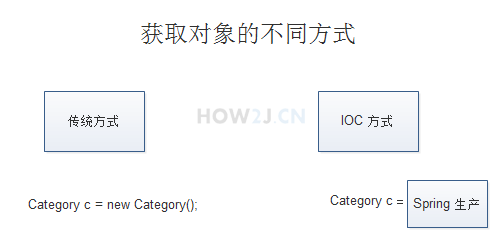什么是Spring框架:
Spring是一个基于IOC和AOP的结构J2EE系统的框架:
IOC 反转控制 是Spring的基础,Inversion Of Control,简单说就是创建对象由以前的程序员自己new 构造方法来调用,变成了交由Spring创建对象;
DI 依赖注入 Dependency Inject, 简单地说就是拿到的对象的属性,已经被注入好相关值了,直接使用即可。
原理分析:
以获取对象的方式来进行比较
传统的方式:
通过new 关键字主动创建一个对象。
IOC方式:
对象的生命周期由Spring来管理,直接从Spring那里去获取一个对象。 IOC是反转控制
(Inversion Of Control)的缩写,就像控制权从本来在自己手里,交给了Spring。
打个比喻:
传统方式:相当于你自己去菜市场new 了一只鸡,不过是生鸡,要自己拔毛,去内脏,再上
花椒,酱油,烤制,经过各种工序之后,才可以食用。
用 IOC:相当于去馆子(Spring)点了一只鸡,交到你手上的时候,已经五味俱全,你就只管
吃就行了。

接下来通过运行TestSpring演示如何用Spring获取一个对象,并打印其name以及使用IOC的方式,对Product对象,注入一个Category对象
(创建项目以及导包过程已省略,关于spring项目中需要的jar包介绍,请点击此处)
准备pojo Category 、Product,用来演示IOC和DI:
package com.spring.pojo; public class Category { public int getId() { return id; } public void setId(int id) { this.id = id; } public String getName() { return name; } public void setName(String name) { this.name = name; } private int id; private String name; }
package com.spring.pojo; public class Product { private int id; private String name; private Category category; public int getId() { return id; } public void setId(int id) { this.id = id; } public String getName() { return name; } public void setName(String name) { this.name = name; } public Category getCategory() { return category; } public void setCategory(Category category) { this.category = category; } }
创建applicationContext.xml:
在src目录下新建applicationContext.xml文件;
applicationContext.xml是Spring的核心配置文件,通过关键字p即可获取Product对象
(IOC过程),该对象获取的时候,即被注入了字符串"product 1“到name属性中(DI过程)。
在创建Product的时候注入一个Category对象,注意,这里要使用ref来注入另一个对象(DI过程)
<?xml version="1.0" encoding="UTF-8"?> <beans xmlns="http://www.springframework.org/schema/beans" xmlns:xsi="http://www.w3.org/2001/XMLSchema-instance" xmlns:aop="http://www.springframework.org/schema/aop" xmlns:tx="http://www.springframework.org/schema/tx" xmlns:context="http://www.springframework.org/schema/context" xsi:schemaLocation=" http://www.springframework.org/schema/beans http://www.springframework.org/schema/beans/spring-beans-3.0.xsd http://www.springframework.org/schema/aop http://www.springframework.org/schema/aop/spring-aop-3.0.xsd http://www.springframework.org/schema/tx http://www.springframework.org/schema/tx/spring-tx-3.0.xsd http://www.springframework.org/schema/context http://www.springframework.org/schema/context/spring-context-3.0.xsd"> <bean name="c" class="com.spring.pojo.Category"> <property name="name" value="category 1" /> </bean>
<bean name="p" class="com.how2java.pojo.Product"> <property name="name" value="product1" /> <property name="category" ref="c" /> </bean>
</beans>

package com.spring.test; import org.springframework.context.ApplicationContext; import org.springframework.context.support.ClassPathXmlApplicationContext; import com.spring.pojo.Product; public class TestSpring { public static void main(String[] args) { //读取配置文件 ApplicationContext context = new ClassPathXmlApplicationContext( new String[] { "applicationContext.xml" }); //通过关键字“c”,从spring中获取Category对象 Product p = (Product) context.getBean("p");
//p.getName()获取p对象中属性name的值,p.getCategory().getName()获取category的name值 System.out.println(p.getName());
System.out.println(p.getCategory().getName());
}
}
注:读取配置文件:
//方式一:(只能读取一个配置文件) ApplicationContext context = new ClassPathXmlApplicationContext("applicationContext.xml"); //方式二:(可读取一个或多个配置文件) ApplicationContext context = new ClassPathXmlApplicationContext( new String[] { "applicationContext.xml" });
原文地址:https://how2j.cn/k/spring/spring-injection/88.html#nowhere